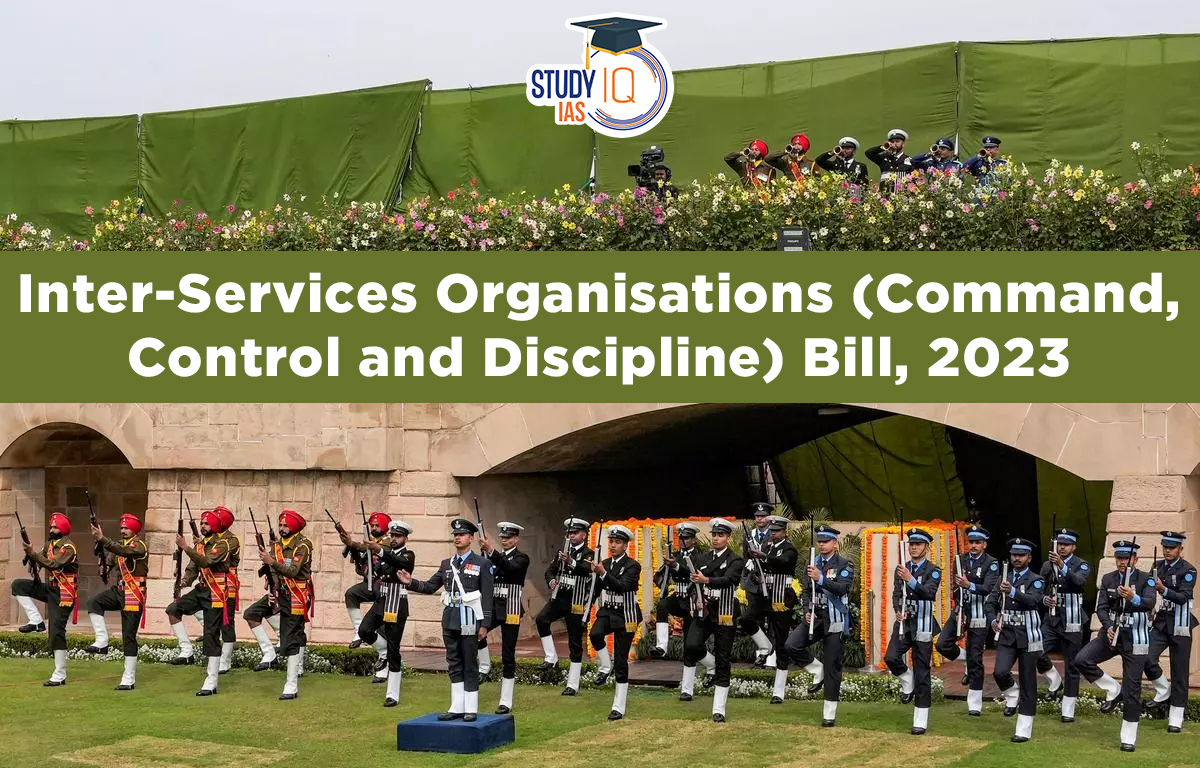Table of Contents
Context: Recently, the government introduced a Bill which seeks to empower designated defence heads of inter-services organisations with certain administrative and disciplinary powers over all personnel serving in the command or attached to it.
What are Inter-Services Organisations?
- Inter-services organisations are entities in the Indian Armed Forces that are jointly operated by the Indian Army, Navy, and Air Force.
- These organisations are responsible for carrying out tasks that require the collaboration of all three services, such as strategic planning, intelligence gathering, and joint military operations.
- Some examples of inter-services organisations in India include the Defence Intelligence Agency, the Integrated Defence Staff, and the Andaman and Nicobar Command.
- These organisations enable the Indian Armed Forces to function as a cohesive and coordinated unit, which is essential for the security and defense of the country.

Indian Armed Forces: They consist of three main branches:
- Indian Army: It is the land-based branch and is the largest among the three branches. It is responsible for land-based military operations, including ground warfare and counter-terrorism.
- Indian Navy: It is the naval branch and is responsible for safeguarding India’s maritime borders.
- Indian Air Force: It is the aerial branch and is responsible for aerial warfare and the defense of Indian airspace.
The Rationale Behind the Proposed Law
- Currently, soldiers from their respective services are governed by different Acts of Parliament- Navy Act of 1957, the Air Force Act of 1950, and the Army Act of 1950.
- Under these acts, officers can exercise disciplinary powers only over personnel from their own service.
- This has created administrative and disciplinary challenges in joint service setups, as officers from one service do not have the necessary authority over personnel from another service.
What are the Key Provisions in the Bill?
- Inter-services Organisation: As per the bill, the central government may constitute an Inter-services Organisation which has personnel belonging to at least two of the three services: the army, the navy, and the air force.
- Control of Inter-services Organisations: The Bill empowers the Commander-in-Chief or the Officer-in-Command of an Inter-services Organisation to exercise command and control over the personnel serving in or attached to it.
- He would be responsible for maintaining discipline and ensuring proper discharge of duties by the service personnel.
- Superintendence: The superintendence of an Inter-services Organisation will be vested in the central government. The government may also issue directions to such organisations on grounds of national security, general administration, or public interest.
- Commanding Officer: The Bill provides for a Commanding Officer who will be in command of a unit, ship, or establishment.
- The officer will also perform duties assigned by the Commander-in-Chief or Officer-in-Command of the Inter-services Organisation.
- The Commanding Officer will be empowered to initiate all disciplinary or administrative actions over the personnel appointed, deputed, posted, or attached to that Inter-services Organisation.
- Other forces under central government: The central government may notify any force raised and maintained in India to which the Bill will apply. This would be in addition to army, navy, and air force personnel.
Indian Armed Forces: They consist of three main branches:
- Indian Army: It is the land-based branch and is the largest among the three branches. It is responsible for land-based military operations, including ground warfare and counter-terrorism.
- Indian Navy: It is the naval branch and is responsible for safeguarding India’s maritime borders.
- Indian Air Force: It is the aerial branch and is responsible for aerial warfare and the defense of Indian airspace.
The Rationale Behind the Proposed Law
- Currently, soldiers from their respective services are governed by different Acts of Parliament- Navy Act of 1957, the Air Force Act of 1950, and the Army Act of 1950.
- Under these acts, officers can exercise disciplinary powers only over personnel from their own service.
- This has created administrative and disciplinary challenges in joint service setups, as officers from one service do not have the necessary authority over personnel from another service.
What are the Key Provisions in the Bill?
- Inter-services Organisation: As per the bill, the central government may constitute an Inter-services Organisation which has personnel belonging to at least two of the three services: the army, the navy, and the air force.
- Control of Inter-services Organisations: The Bill empowers the Commander-in-Chief or the Officer-in-Command of an Inter-services Organisation to exercise command and control over the personnel serving in or attached to it.
- He would be responsible for maintaining discipline and ensuring proper discharge of duties by the service personnel.
- Superintendence: The superintendence of an Inter-services Organisation will be vested in the central government. The government may also issue directions to such organisations on grounds of national security, general administration, or public interest.
- Commanding Officer: The Bill provides for a Commanding Officer who will be in command of a unit, ship, or establishment.
- The officer will also perform duties assigned by the Commander-in-Chief or Officer-in-Command of the Inter-services Organisation.
- The Commanding Officer will be empowered to initiate all disciplinary or administrative actions over the personnel appointed, deputed, posted, or attached to that Inter-services Organisation.
- Other forces under central government: The central government may notify any force raised and maintained in India to which the Bill will apply. This would be in addition to army, navy, and air force personnel.


 SSC CGL Exam 2025 Apply Online Starts Ap...
SSC CGL Exam 2025 Apply Online Starts Ap...
 Daily Quiz 19 April 2025
Daily Quiz 19 April 2025
 Vehicle-to-Grid (V2G) Technology and its...
Vehicle-to-Grid (V2G) Technology and its...





















